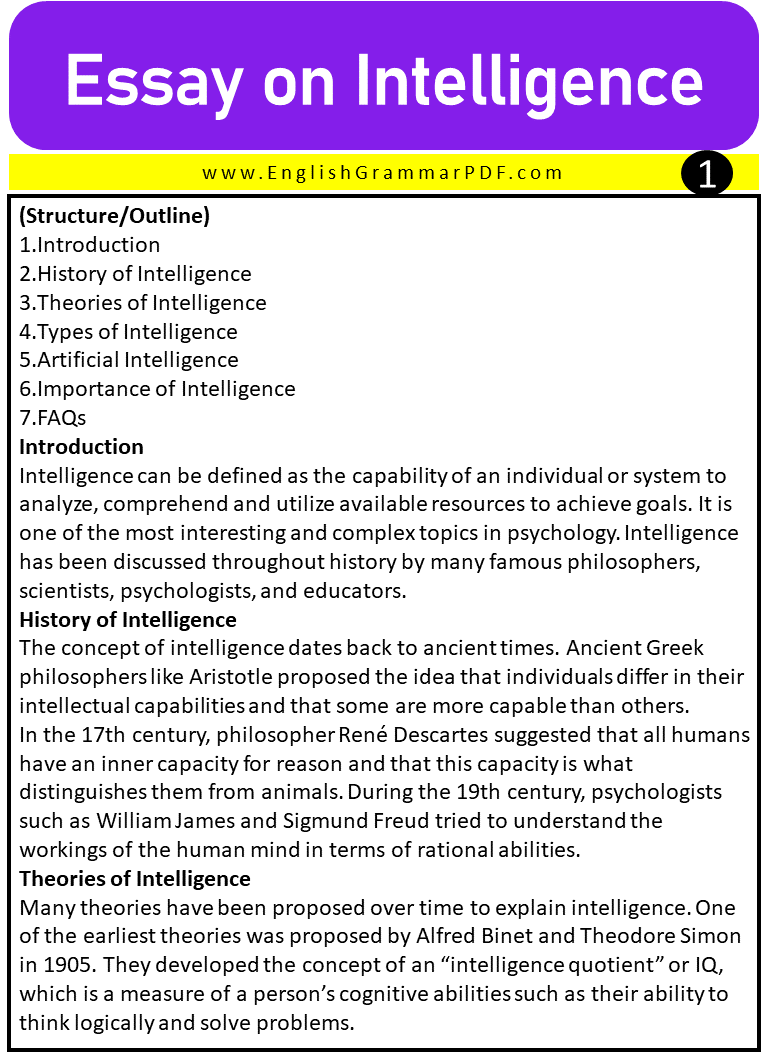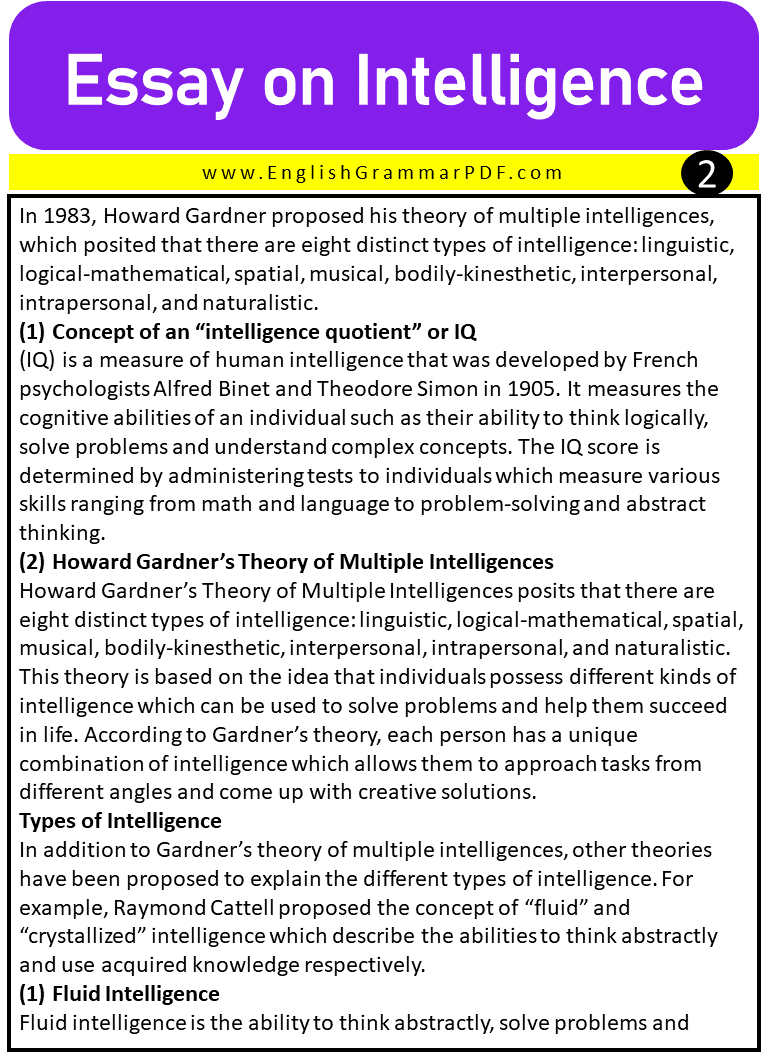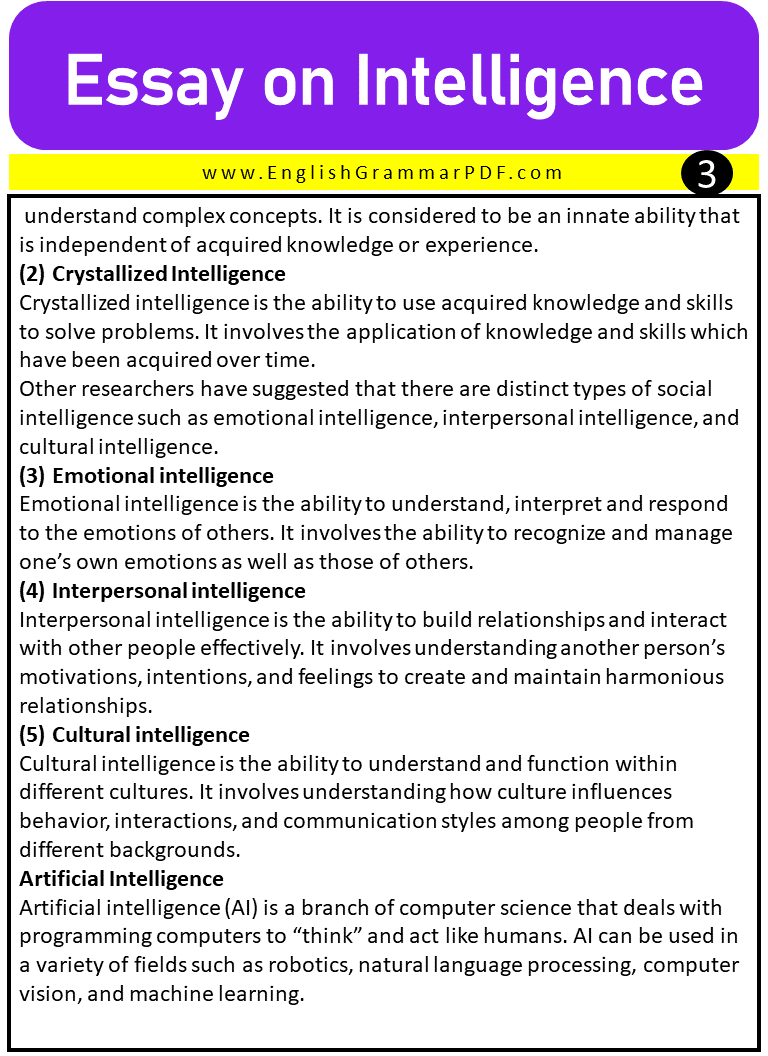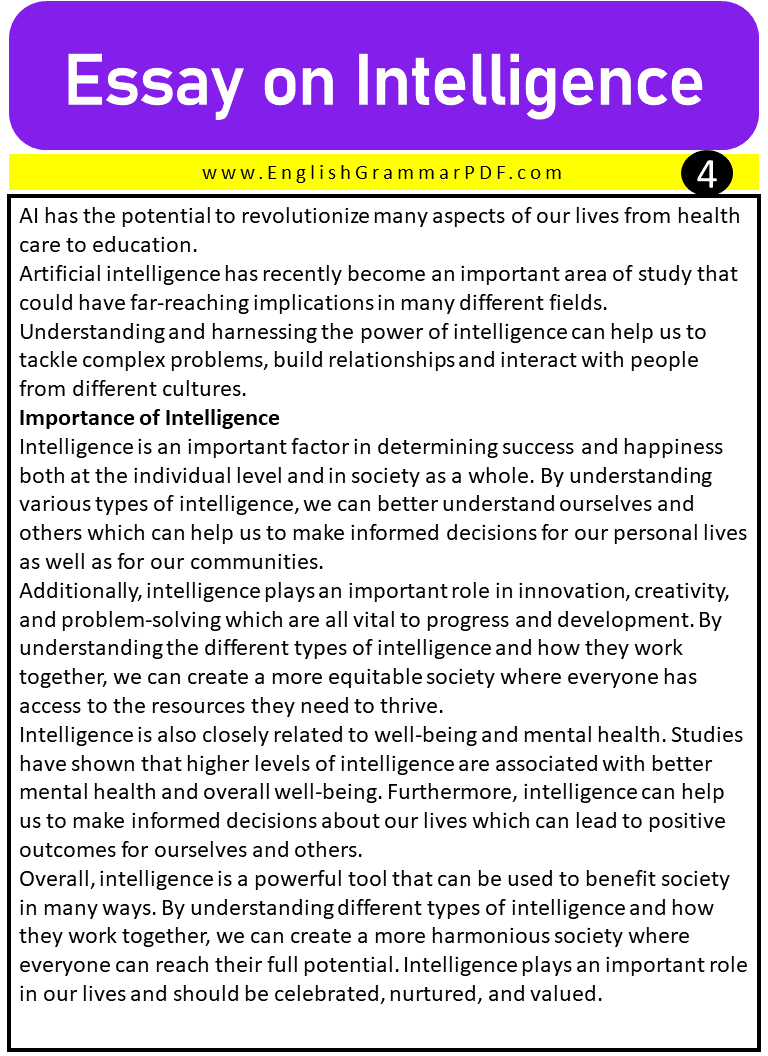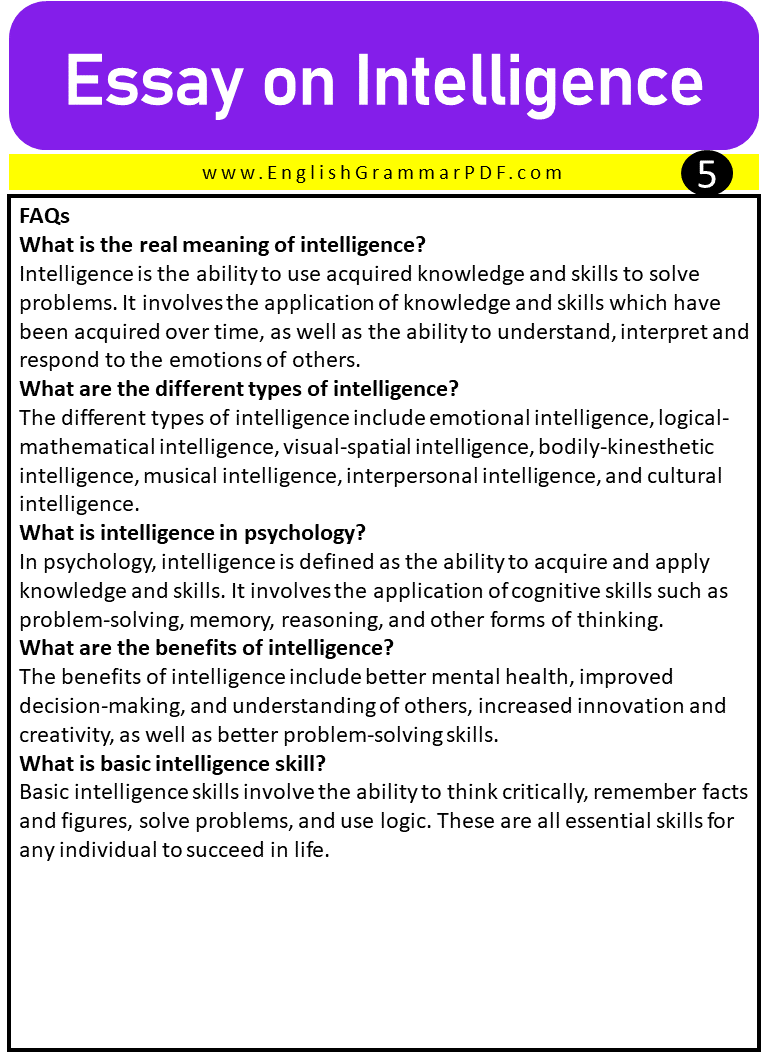Essay On Intelligence (Structure/Outline)
- Introduction
- History of Intelligence
- Theories of Intelligence
- Types of Intelligence
- Artificial Intelligence
- Importance of Intelligence
- FAQs
Introduction
Intelligence can be defined as the capability of an individual or system to analyze, comprehend and utilize available resources to achieve goals. It is one of the most interesting and complex topics in psychology. Intelligence has been discussed throughout history by many famous philosophers, scientists, psychologists, and educators.
History of Intelligence
The concept of intelligence dates back to ancient times. Ancient Greek philosophers like Aristotle proposed the idea that individuals differ in their intellectual capabilities and that some are more capable than others.
In the 17th century, philosopher René Descartes suggested that all humans have an inner capacity for reason and that this capacity is what distinguishes them from animals. During the 19th century, psychologists such as William James and Sigmund Freud tried to understand the workings of the human mind in terms of rational abilities.
Theories of Intelligence
Many theories have been proposed over time to explain intelligence. One of the earliest theories was proposed by Alfred Binet and Theodore Simon in 1905. They developed the concept of an “intelligence quotient” or IQ, which is a measure of a person’s cognitive abilities such as their ability to think logically and solve problems.
In 1983, Howard Gardner proposed his theory of multiple intelligences, which posited that there are eight distinct types of intelligence: linguistic, logical-mathematical, spatial, musical, bodily-kinesthetic, interpersonal, intrapersonal, and naturalistic.
(1) Concept of an “intelligence quotient” or IQ
(IQ) is a measure of human intelligence that was developed by French psychologists Alfred Binet and Theodore Simon in 1905. It measures the cognitive abilities of an individual such as their ability to think logically, solve problems and understand complex concepts. The IQ score is determined by administering tests to individuals which measure various skills ranging from math and language to problem-solving and abstract thinking.
(2) Howard Gardner’s Theory of Multiple Intelligences
Howard Gardner’s Theory of Multiple Intelligences posits that there are eight distinct types of intelligence: linguistic, logical-mathematical, spatial, musical, bodily-kinesthetic, interpersonal, intrapersonal, and naturalistic.
This theory is based on the idea that individuals possess different kinds of intelligence which can be used to solve problems and help them succeed in life. According to Gardner’s theory, each person has a unique combination of intelligence which allows them to approach tasks from different angles and come up with creative solutions.
Types of Intelligence
In addition to Gardner’s theory of multiple intelligences, other theories have been proposed to explain the different types of intelligence. For example, Raymond Cattell proposed the concept of “fluid” and “crystallized” intelligence which describe the abilities to think abstractly and use acquired knowledge respectively.
(1) Fluid Intelligence
Fluid intelligence is the ability to think abstractly, solve problems and understand complex concepts. It is considered to be an innate ability that is independent of acquired knowledge or experience.
(2) Crystallized Intelligence
Crystallized intelligence is the ability to use acquired knowledge and skills to solve problems. It involves the application of knowledge and skills which have been acquired over time.
Other researchers have suggested that there are distinct types of social intelligence such as emotional intelligence, interpersonal intelligence, and cultural intelligence.
(3) Emotional intelligence
Emotional intelligence is the ability to understand, interpret and respond to the emotions of others. It involves the ability to recognize and manage one’s own emotions as well as those of others.
(4) Interpersonal intelligence
Interpersonal intelligence is the ability to build relationships and interact with other people effectively. It involves understanding another person’s motivations, intentions, and feelings to create and maintain harmonious relationships.
(5) Cultural intelligence
Cultural intelligence is the ability to understand and function within different cultures. It involves understanding how culture influences behavior, interactions, and communication styles among people from different backgrounds.
Artificial Intelligence
Artificial intelligence (AI) is a branch of computer science that deals with programming computers to “think” and act like humans. AI can be used in a variety of fields such as robotics, natural language processing, computer vision, and machine learning.
AI has the potential to revolutionize many aspects of our lives from health care to education.
Artificial intelligence has recently become an important area of study that could have far-reaching implications in many different fields. Understanding and harnessing the power of intelligence can help us to tackle complex problems, build relationships and interact with people from different cultures.
Discover More:
Importance of Intelligence
Intelligence is an important factor in determining success and happiness both at the individual level and in society as a whole. By understanding various types of intelligence, we can better understand ourselves and others which can help us to make informed decisions for our personal lives as well as for our communities.
Additionally, intelligence plays an important role in innovation, creativity, and problem-solving which are all vital to progress and development. By understanding the different types of intelligence and how they work together, we can create a more equitable society where everyone has access to the resources they need to thrive.
Intelligence is also closely related to well-being and mental health. Studies have shown that higher levels of intelligence are associated with better mental health and overall well-being. Furthermore, intelligence can help us to make informed decisions about our lives which can lead to positive outcomes for ourselves and others.
Overall, intelligence is a powerful tool that can be used to benefit society in many ways. By understanding different types of intelligence and how they work together, we can create a more harmonious society where everyone can reach their full potential. Intelligence plays an important role in our lives and should be celebrated, nurtured, and valued.
FAQs
What is the real meaning of intelligence?
Intelligence is the ability to use acquired knowledge and skills to solve problems. It involves the application of knowledge and skills which have been acquired over time, as well as the ability to understand, interpret and respond to the emotions of others.
What are the different types of intelligence?
The different types of intelligence include emotional intelligence, logical-mathematical intelligence, visual-spatial intelligence, bodily-kinesthetic intelligence, musical intelligence, interpersonal intelligence, and cultural intelligence.
What is intelligence in psychology?
In psychology, intelligence is defined as the ability to acquire and apply knowledge and skills. It involves the application of cognitive skills such as problem-solving, memory, reasoning, and other forms of thinking.
What are the benefits of intelligence?
The benefits of intelligence include better mental health, improved decision-making, and understanding of others, increased innovation and creativity, as well as better problem-solving skills.
What is basic intelligence skill?
Basic intelligence skills involve the ability to think critically, remember facts and figures, solve problems, and use logic. These are all essential skills for any individual to succeed in life.
Essay On Intelligence PDF (& Infographics)
